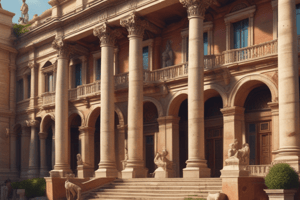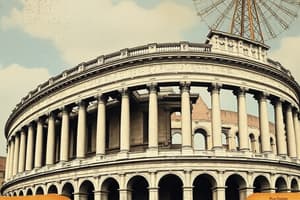Podcast
Questions and Answers
What was the primary purpose of Roman theaters being built up by means of concrete vaulting?
What was the primary purpose of Roman theaters being built up by means of concrete vaulting?
- To create an impressive architectural structure
- To provide better acoustics for performances
- To allow for the construction of multiple tiers of seating
- To resist the weight and pressure of supporting tiers of seats (correct)
Which architectural structure in Roman palaces and houses typically contained the Tepidarium, Calidarium, and Frigidarium?
Which architectural structure in Roman palaces and houses typically contained the Tepidarium, Calidarium, and Frigidarium?
- Balneum (correct)
- Triumphal Arches
- Palaces
- Amphitheaters
What was the main function of the ARCH OF TITUS in Rome?
What was the main function of the ARCH OF TITUS in Rome?
- To serve as a private bath facility
- To host gladiatorial combats
- To house the Emperor
- To commemorate victorious campaigns of emperors (correct)
What distinguished the architectural style of West-Asiatic structures from the Egyptian, Greek, and Roman styles?
What distinguished the architectural style of West-Asiatic structures from the Egyptian, Greek, and Roman styles?
Which feature best describes the Amphitheaters like the Colosseum in Rome?
Which feature best describes the Amphitheaters like the Colosseum in Rome?
What is the function of a Tepidarium in a Roman bath complex?
What is the function of a Tepidarium in a Roman bath complex?
Which Roman bath complex was the largest with a capacity of 3,000 bathers?
Which Roman bath complex was the largest with a capacity of 3,000 bathers?
What is the function of an Apodyteria in a Roman bath complex?
What is the function of an Apodyteria in a Roman bath complex?
Which architectural structure is characterized as a large open space with trees, statues, and fountains?
Which architectural structure is characterized as a large open space with trees, statues, and fountains?
In a Roman bath complex, what is the purpose of a Sudarium?
In a Roman bath complex, what is the purpose of a Sudarium?
What is the primary function of a Palaestra in a Roman bath complex?
What is the primary function of a Palaestra in a Roman bath complex?
What type of building serves to connect public monuments and provide shelter?
What type of building serves to connect public monuments and provide shelter?
Which of the following was a covered meeting place for democratically elected councils?
Which of the following was a covered meeting place for democratically elected councils?
Which Roman architectural structure served as a wrestling school usually in the form of a court?
Which Roman architectural structure served as a wrestling school usually in the form of a court?
What feature was characteristic of Roman Gymnasiums?
What feature was characteristic of Roman Gymnasiums?
What was a key element of Roman architecture between the 2nd and 4th centuries A.D.?
What was a key element of Roman architecture between the 2nd and 4th centuries A.D.?
Which architectural structure was primarily used by musicians for presenting their works and seeking public approval?
Which architectural structure was primarily used by musicians for presenting their works and seeking public approval?
Flashcards are hidden until you start studying
Study Notes
Roman Theaters
- Built using concrete vaulting to support tiers of seats
- Example: Theater of Marcellus, Rome
Baths (Thermae)
- Contained: Tepidarium (warm room), Calidarium (hot room), Frigidarium (cooling room), Sudarium (dry sweating room), Apodyteria (dressing room), Palaestra (physical exercise), and Unctuaria (oils and perfumes)
- Examples: Thermae Caracalla, Thermae of Diocletian, Thermae of Titus, Thermae of Grippa
- Thermae of Diocletian was the largest, with a capacity of 3,000 bathers
Triumphal Arches
- Erected to commemorate victories of emperors and generals
- Examples: Arch of Titus, Arch of Constantine, Rome
Palaces
- Used to house the Emperor
Circular and Polygonal Temples
- Derived from Greek and Etruscan temples
- Example: The Pantheon, Rome
Amphitheaters
- Used for gladiatorial combats, elliptical in plan
- Example: Colosseum, Rome
Public Buildings
- Stoa: a long colonnaded building for shelter and connection of public monuments
- Prytaneion: a senate house for chief dignitaries
- Agora or Town Square: an open-air meeting place for business and marketplace
- Bouleuterion: a council house, covered meeting place of the democratically elected councils
- Odeion: a theater building for musical performances
- Stadium/Stadion: a foot race course and athletic performances
- Hippodrome: similar to a stadium
Gymnasium and Palaestra
- Palaestra: a court for wrestling school
- Gymnasium: a place for physical exercise, prototype of Roman "Thermae"
- Parts of Gymnasium: Courts for athletes, Tanks for bathers, Dressing rooms, Exedrae, and Ephebium (lectures)
Studying That Suits You
Use AI to generate personalized quizzes and flashcards to suit your learning preferences.




